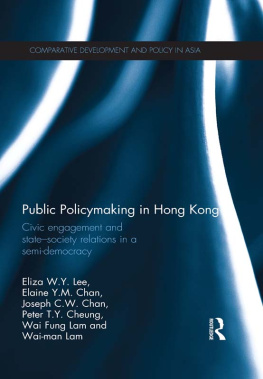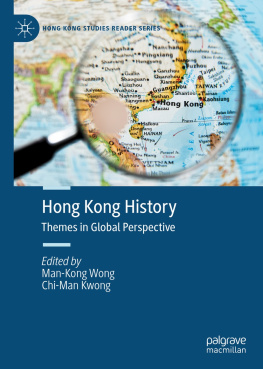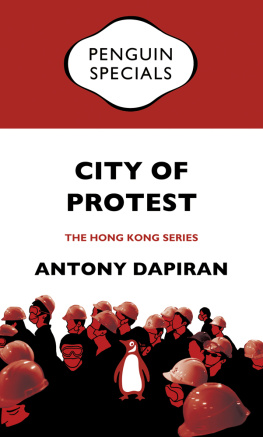First published 2000 by Ashgate Publishing
Reissued 2018 by Routledge
2 Park Square, Milton Park, Abingdon, Oxon OX14 4RN
711 Third Avenue, New York, NY 10017, USA
Routledge is an imprint of the Taylor & Francis Group, an informa business
Copyright Ahmed Shafiqul Huque and Grace O. M. Lee 2000
All rights reserved. No part of this book may be reprinted or reproduced or utilised in any form or by any electronic, mechanical, or other means, now known or hereafter invented, including photocopying and recording, or in any information storage or retrieval system, without permission in writing from the publishers.
Notice:
Product or corporate names may be trademarks or registered trademarks, and are used only for identification and explanation without intent to infringe.
Publisher's Note
The publisher has gone to great lengths to ensure the quality of this reprint but points out that some imperfections in the original copies may be apparent.
Disclaimer
The publisher has made every effort to trace copyright holders and welcomes correspondence from those they have been unable to contact.
A Library of Congress record exists under LC control number: 00134822
ISBN 13: 978-1-138-73637-5 (hbk)
ISBN 13: 978-1-315-18596-5 (ebk)
The management of public services is an increasingly difficult task. Providing public services of an acceptable quality on a regular basis is an intimidating responsibility. This has been further complicated due to ever-increasing demands in the face of a decreasing allocation of funds for producing and delivering such services. Furthermore, rapid changes taking place in societies calls for new skills and the innovative application of knowledge to the problems of public organisations. Generally, traditional bureaucratic organisations find it difficult to deal with the increasing demands imposed upon them by the changing circumstances.
While routine management of public services is a major challenge, encountering crises in the form of non-routine problems makes public managers' lives even more difficult. The operation of public agencies cannot be expected to continue in a routine and expected manner. New services are required, demands have to be faced and responded to, activities do not proceed as planned, and problems emerge in unexpected places and at unusual times. No matter how critical a new problem is, public managers have to respond to such deviations from their regular pattern of work, and continue to provide public services.
Hong Kong provides an interesting background for exploring the issue of managing crises in the area of public management. The ever-expanding scope of public services management includes several tangible and intangible activities, and both types are equally important. While some activities are concrete in nature and can be appreciated in the form of better physical facilities and direct services such as medical care and education, others are somewhat obscured from public view. Yet, the importance of ensuring that the public have full confidence in the government and its commitment to transparency, maintaining open channels of communication between the government and the governed, and reaffirming the effectiveness of the rule of law in a country are not always fully appreciated by authorities. Consequently, these important areas of public management are often relegated to the background, as organisations emphasise areas that produce visible and quantifiable results. In focusing on the provision of concrete and tangible output in the form of public services, governments may often neglect the intangible services that must also be provided to the public.
Poor performance in the provision of the intangible public services can contribute to major crises in public organisations. This book examines four such cases in the context of the rapidly changing political and social environment of the new Hong Kong Special Administrative Region of the People's Republic of China. In the wake of its reversal of sovereignty to China, a number of crises were encountered in the management of public services in Hong Kong. While some of these might have been tolerated as an occasional lapse of judgement or administrative error/oversight in the past, a democratically inclined polity and socially conscious public took notice of the perceived threat to transparency, open communication, and the rule of law and the poor performance by senior public servants. These events are, therefore, recognised as "crisis", and efforts are made to explain their causes and consequences, and to compile a list of lessons to be learned from the experience.
This book is the outcome of a long period of planning and contemplation, although the end product had to be prepared in a relatively short period of time. The literature on managing crises in public organisations is rather limited and that was one of the principal reasons for undertaking this study. The use of recent cases from the public sector in Hong Kong will help readers understand the difficulties faced by modern governments in providing basic services to the public, along with fulfilling the responsibility of establishing trust and confidence in a new government framework.
This study was made possible through a strategic research grant from the City University of Hong Kong. We would also like to acknowledge a debt of gratitude to Lisa Wei-yee Wong. She has been an excellent contributor to the study and diligently collected material on the cases. Her insight has been extremely useful in understanding and analysing the crises outlined in this book. Thanks must also be expressed to Ms. Jessie Wai-Ki Lui for her assistance with word-processing.
Professor Paul Wilding of the University of Manchester provided valuable advice from the inception of the study. He has been a source of constant support and encouragement throughout the period of study and has won our admiration as a superior human being. We are also grateful to our colleagues in the Department of Public and Social Administration at the City University of Hong Kong for helpful comments and suggestions received. The School of Business and Public Management at Victoria University of Wellington, New Zealand, helped by providing access to facilities for several weeks.
Thanks are also due to a number of friends and colleagues who provided help, advice and encouragement throughout the manuscript's preparation. We would like to mention Muhammad Yeahia Akhter, Jonathan Boston, Bob Gregory, John Martin, Pat Walsh, and Habib Zafarullah in this regard.
We would like also to register our deepest regards for our spouses Yasmin and John - and appreciation for our children - Shineen, Ariqa, Jane, and Edward.
We, however, remain responsible for any shortcomings of the study.
Ahmed Shafiqul Huque
Grace O.M. Lee












